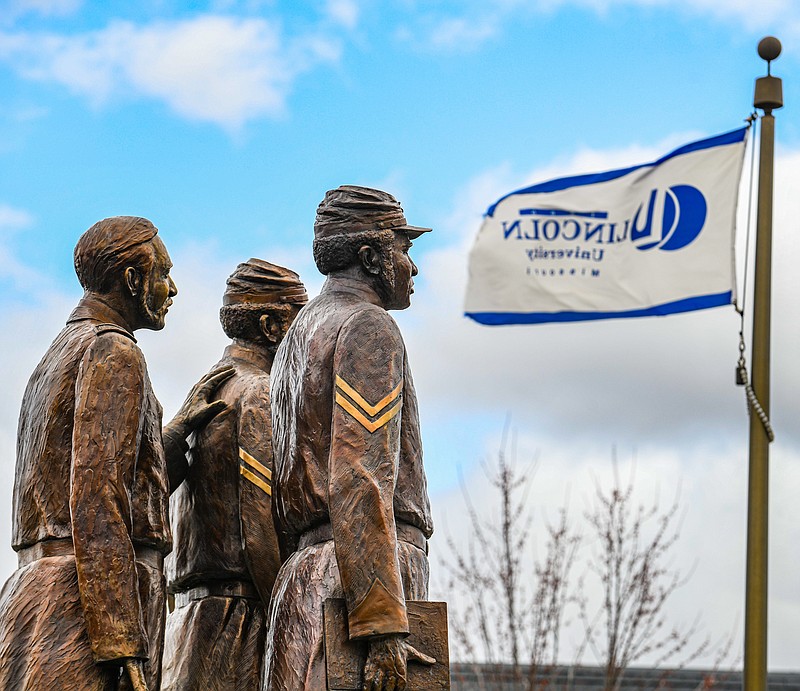Lincoln University students can expect a fresh financial start and much of the same COVID-19 guidelines for the upcoming fall semester.
The Lincoln University Board of Curators voted Thursday to use federal COVID-19 relief funds from the CARES Act to forgive $1.5 million in student balances for roughly 930 current students.
LU will cover student balances racked up from the spring 2020 semester to the summer 2021 semester.
LU Communications Director Misty Nunn said the $1.5 million covers the student balances for all current students who took on debt since the start of the COVID-19 pandemic.
Students are not required to take action for their balance to be eliminated, Nunn said, because the university will automatically forgive the balances by Aug. 6.
The university will use its designated institutional portion of the CARES funding to cover the student debts, meaning students can still expect to receive some additional funding through the direct student aid portion in the fall.
Debt incurred for the upcoming fall 2021 semester will not be forgiven, but Nunn said the university hopes students use the funds they will be provided through the CARES Act's direct student aid to pay for fall balances.
According to the university Rules and Regulations, students with an outstanding balance cannot register for classes and cannot receive a transcript or diploma.
Nunn said student balances are considered outstanding when they reach $600.
"We've had students that haven't been able to come back to school because they are carrying balances," Nunn said. "We have this CARES Act funding that is available to us and what better way to spend that money than to help our students eliminate that debt that they have."
Student balances grow as they are charged for tuition and fees, which are due at the time of registration.
Nunn said the average LU student balance was $1,634.
"Paying for college has long been a point of concern for far too many of our students, but even more so as we deal with the economic issues the pandemic has caused," Interim President John Moseley said in a news release. "Our founders used the funds they had to provide the opportunity of education back in 1866. We are doing the same for our students in 2021, thanks to the CARES Act."
Moseley said some students were working two or three jobs to pay off their student balances.
The action comes just before the final weeks of registration for the fall semester.
Moseley said he hopes the debt clearance can boost enrollment and help retain more students.
"We recognize that finances are sometimes the obstacle that stands in the way of our students continuing with us from one semester to the next," Moseley said. "Through eliminating these balances now, we are hopeful this will help us begin an upward trend in our enrollment by giving these students a fresh start."
As of July 26, Lincoln had 739 total undergraduate students registered for the upcoming semester. By this time last year, 820 total undergraduates were registered.
Moseley said he expects enrollment to remain fairly consistent with levels from last year, which was 1,893 students last year.
Students can expect to see much of the same COVID-19 protocols in place when they return as the university re-implemented its mask requirement for all indoor spaces starting Monday.
The policy is in response to new Centers for Disease Control and Prevention guidance encouraging everyone - regardless of vaccination status - to wear masks indoors in areas with high or substantial COVID-19 transmission.
Most of Missouri, including Cole County and its six neighboring counties, falls within the high or substantial transmission rate, according to the CDC COVID Data Tracker.
Moseley said the university's COVID-19 task force, made up of faculty, staff and administrators, has been working weekly since March 2020 to assess how the virus could impact campus.
"Inside university buildings, we're going to go back with the masks as recommended by the CDC with where things currently stand," Moseley said. "That's our plan. We're going to review it, monitor it weekly and, when we're at a point that we feel comfortable removing the masks, then we'll do so."
Moseley said Lincoln will continue encouraging students, faculty and staff to get vaccinated and will host at least three vaccination sites on campus in the upcoming semester.
The first vaccine drive of the semester will be Aug. 11.
The University Health Center will continue offering COVID-19 testing, Moseley said, and there is reserved campus living space for quarantining and isolation.
"The COVID task force has spent a lot of time preparing, it's just we do expect that we will have cases on our campus when school resumes, especially with the presence of the delta variant here in Missouri," Moseley said.
Social distancing will be encouraged, he said, but not required as it was previously.
"We're hopeful and prayerful that our students will continue to do what's necessary to take care of themselves and use as much caution as possible both in our classrooms and in our residence halls, and as they navigate the community as well," Moseley said.
He said the university will continue relying on CDC guidance to make future decisions.

